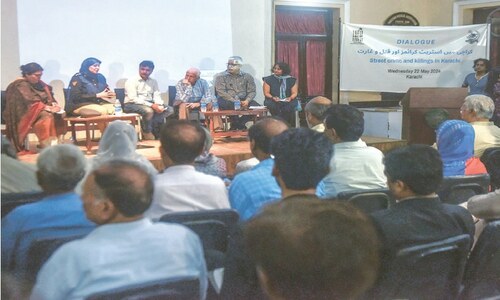SOME of us think that upkeep and safety of Karachi’s colonial buildings is an issue that caught the attention of history lovers and conservationists in the last decade or so. Well, in the last decade or so it did get impetus, but the fact is that not all pre-partition structures were rock solid from the day they were built. Some of the buildings in the city became unsteady just after 50 or 60 years of their making. There are areas that were, and still are, dotted with works of stonemasonry that needed to be looked after and maintained.
In May 1966, a portion of a house in the old Karachi vicinity collapsed, causing injuries to some members of the household. The Karachi Metropolitan Corporation (KMC) was aware of the situation and had already done a little work to salvage the buildings. The partial damage to that house brought into focus the need to expedite the process. On May 23, 1966 it was reported that the KMC had undertaken a survey of all, what it called, enfeebled structures in the city which were dangerous for human habitation. A list of such buildings was to be prepared and those that were too weak and had outlasted their utility were to be recommended for demolition. Obviously, it is saddening for lovers of history and architecture. But when human lives are in danger, one has to swallow the bitter pill.
Speaking of sadness, on May 24, readers of Urdu literature received a terrible shock to know that the distinguished critic and writer Niaz Fatehpuri had passed away. He was 81. He was buried in the Nazimabad graveyard. His burial was attended, among others, by Jamiluddin Aali and Hakim Mohamad Saeed. The offices of the Pakistan Writers Guild and the Anjuman Taraqqi-i-Urdu remained closed on May 24. This newspaper published a short obituary of the writer according to which he was born in Barabanki district and was educated in Lucknow and Rampur. In 1907, he was superintendent of police in Ujaigar state and municipal secretary in Hansi, Hessar district. Niaz sahib wrote more than 20 books, including Man-o-Yazdan, Maktubat, Intiqadiyat, Jamalistan and Nigaristan. He was editor of Nigar, a reputed monthly journal published from Karachi.
It was indeed a dark and regrettable phase for readers of Urdu literature. Interestingly, it was also the case of darkness for Karachiites in general, as ever since the summer sun had begun beating down on them, power outages had become a frequent occurrence. On May 22, almost the entire city experienced a power breakdown due to short circuit which lasted for an hour. Those were the days when the Karachi Electric Supply Corporation (as it was known back then) knew how to assuage people’s anger. On May 23, the corporation issued a statement expressing its ‘regrets’ for the inconvenience that the public had to undergo.
Mind you, not all stakeholders of the city were that courteous. For example, on May 24, the media reported that the cases of rude behaviour and the use of abusive language by bus conductors with acts of overloading buses and reckless driving were on the rise because the traffic police seemed to have relaxed their vigil to challan and punish them. Perhaps, this is why it prompted a couple of days later the traffic police to advise every driver of vehicles to carry a licence.
Now moving on to a different kind of police case: on May 26, about 5,000 sweepers went on a partial strike to protest against the abduction from Nazimabad of a girl belonging to their community. On May 27, it became a full-fledged strike. Four thousand sanitary workers were on the KMC payroll while others were working privately in different localities. And 3,000 of them were Christians. A Karachi Police spokesman said the abduction case had been registered with the Nazimabad police. The phrase déjà vu springs to mind, although, and weirdly, in the present-day context.
Published in Dawn, May 23rd, 2016















































Dear visitor, the comments section is undergoing an overhaul and will return soon.